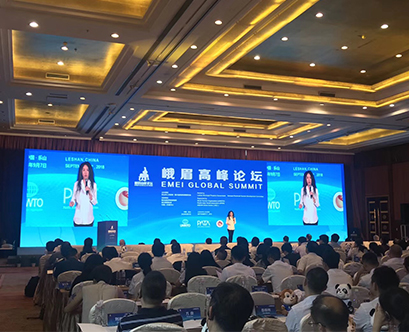
“房子是用来住的,不是用来炒的。”
中国该如何解决房地产泡沫?

译者:倪婷 & 高浦铭
校对:周树人
策划:鲁迅
Stop speculating, start living
房住不炒
本文选自 The Economist | 取经号原创翻译
关注 取经号,回复关键词“外刊”
获取《经济学人》等原版外刊获得方法
PAN JINGYUAN has little time for traditional family values. The 26-year-old says she has no intention of ever getting married and loves living far from her parents. But Ms Pan is traditional in one way-she sees a home as the best investment for her savings. She plans to buy a small flat in the southern city of Shenzhen, where she works at the headquarters of a restaurant chain. “There is no way the government would ever let prices really fall,” she says.
潘静媛(音)基本与传统家庭的价值观绝缘。这位26岁的女孩说,她不打算结婚,而且喜欢住的离父母远一些。但在买房方面,潘小姐还是比较传统的——她认为买房是最好的投资。她打算在其供职的餐饮连锁企业总部所在地深圳购买一套小公寓。她说:”政府不可能让房价真正下跌的”。
Such confidence has long been rewarded. Property prices in cities have roughly quadrupled this century, a rate of growth far exceeding that of the American housing bubble of the early 2000s, albeit from a lower base. This has led to a series of concerns: that homes are increasingly unaffordable, that the economy is too reliant on property and that housing prices, having gone up and up, might someday crash.
这种投资房地产的信心一直都能得到良好的回报。本世纪以来,中国城市房价已经几乎翻了四倍多,虽然基数低,但增长速度远高于本世纪初美国房地产泡沫时期。这引发了一系列的担忧:人们越来越买不起房,国民经济过于依赖房地产,房价一再攀升,可能哪天就会崩盘。
quadruple /kwɑːˈdruː-/ to become four times as big, or to multiply a number or amount by four (使)成为四倍;(使)以四相乘
The government has, until now, tried to reduce the risk by periodically applying brakes on the market. Whenever real estate overheats, the authorities restrict funding to developers and make it difficult for people to buy new homes-for example, by increasing mandatory down-payments. When prices stabilise, they relax the controls. But such measures create volatility. Every three years or so, prices surge again.
到目前为止,政府不时采取调控措施以降低风险。每当房地产过热时,官方就会限制资金流向开发商,并增加购房的难度,比如提高最低首付比例。当房价企稳时,就放宽管控。但这样的措施制造了房价的波动,每隔3年左右时间,房价又开始飙升。
mandatory /-tɔ:r.i/ adjective describes something which must be done, or which is demanded by law 强制的;必须履行的;法定的
down-payment N-COUNT an amount of money that you pay at the time that you buy something, but which is only a part of the total cost of that thing. You usually pay the rest of the cost over a period of time (分期付款的)首期,首付款
So officials have started talking about a “long-term mechanism” to calm the housing market. Several times during the past year China’s leader, Xi Jinping, has said that “homes are for living in, not for speculating on.” The government appears to be adopting three main approaches. Together these could reshape the architecture of China’s housing market.
于是,政府官员开始探讨建立”长效机制”来稳定住房市场。在过去一年里,国家领导人习近平几次讲到”房子是用来住的,不是用来炒的”。政府似乎打算采取三种主要措施,这三种措施联合发力也许能够重塑中国的房地产市场。
The most promising is a push to develop a market for good-quality rental housing. Only about a fifth of urbanites rent homes in China, compared with a third in the rich world. In some countries, such as France and Germany, the proportion of renters is much higher still. China’s rental housing is often shabby because it is aimed at low-income households. Rosealea Yao of Gavekal Dragonomics, a research firm, estimates that only around half of rental units in Beijing, the capital, and Shanghai have their own kitchens and bathrooms.
最有前途的措施是推动建立高质量的租赁住房市场。在中国,只有约1/5的城市居民租房住,而在富裕国家这一比例是1/3。在法国和德国等一些国家,租房的比例甚至更高。由于中国的出租房的目标群体是低收入家庭,所以出租房通常都很破旧。据咨询机构龙洲经讯的姚丽蔷估计,在北京和上海,大概只有一半的出租房有独立厨房和卫生间。
shabby /’ʃæb.i/adjective looking old and in bad condition because of being used for a long time or not being cared for 破烂的,破旧的
No dogs or migrants
外来人员和狗不得入内
A big reason for the slow development of the rental market is that there is not much profit in it. Cities tend to give more benefits to homeowners, such as the right to send children to local schools, so families far prefer to buy homes. It is mainly migrants from the countryside who rent, choosing dingy digs shunned by urbanites. Annual rents are about 1% of house prices, a low yield by global standards. Instead of taking a chance with messy tenants, many investors keep their properties empty, waiting for their values to rise.
租房市场发展缓慢的一个重要原因在于利润不高。城市为房主提供很多福利,如孩子就近入学的权利,于是家庭更倾向于买房。租房者主要是来自农村的外来务工人员,他们选择租住城里人不愿意住的脏兮兮的住所。房子的年租金约为房价的1%,与全球标准相比较,收益较低。许多投资者宁愿让房子空置等待升值,也不愿意出租给乱七八糟的租房者。
dingy /’dɪn.dʒi/ adjective dark and often also dirty 阴暗肮脏的,黑乎乎脏兮兮的
digs / dɪgz; dɪɡz/ n [pl] (Brit infml 口) room(s) rented in sb else’s house; lodgings 在他人房屋里租用的房间; 寄宿房间; 寄宿处
One of the government’s new approaches is to offer incentives to developers to build decent rental properties. It is doing this by selling land for rental projects at steep discounts, in effect guaranteeing hefty yields for developers. In some big cities, plans call for these discounted plots to account for about a quarter of future land supply. The government has promised to give renters the same rights as homeowners, though some doubt that it will actually do this. Many urbanites would resent additional competition for school places.
政府的新措施之一是鼓励开发商建造体面的出租房。具体做法是将土地大打折扣出售给租赁房项目,以此来确保开发商的高额收益。在一些大城市,政府规划要求打折地块要占全部土地供应的四分之一。政府已经承诺给予租房者与房主同样的权利,但有人怀疑政府是否能兑现此承诺。许多城市居民对此额外产生的入学名额竞争感到不满。
hefty /’hef.ti/ adjective large in amount, size, force, etc (数额、尺寸、力量等)大的,可观的
Shenzhen, which borders on Hong Kong, is among the first cities in China to sell large-scale plots for rental housing. The boomtown hopes that good-quality rental homes will attract the skilled workers it needs for high-tech industries. On the city’s edge, Vanke, China’s biggest developer, recently took over an apartment complex and began converting each unit into four or five tiny flats with living space little bigger than a bed. (One of Vanke’s rental projects in Guangzhou, another southern city, is pictured.) The flats may be cramped, but they are clearly superior to other, mostly squalid, rental flats in Shenzhen. For officials, what matters is that Vanke has nearly quintupled the number of apartments available for rent in the complex.
毗邻香港的深圳是首批出售大规模租赁房用地的城市,这座繁荣的大都市想通过高品质的出租房来吸引高科技产业的技术人员。近期,中国最大的房产公司万科接手了深圳市郊的一处住宅区,并开始将小区内的单间住房分隔成四到五套面积比床大不了多少的”微型公寓”(在同省的广州,万科也酝酿着租赁房计划)。虽然面积狭小,但是这些微型公寓明显要比深圳大多脏乱的出租房要更好。对政府来说,重要的是——万科的这一改造把此社区的可租赁房数提高至将近原来的五倍。
A second approach will be the introduction of a property tax. Officials have talked for years about raising an annual levy on homeowners based on the value of their housing, as is commonly done in other countries. A possible benefit would be to nudge speculators to sell or at least rent out homes that they would otherwise leave unoccupied. At the same time it would give local governments a new revenue source, reducing their unhealthy dependence on land sales.
第二个措施是征收房产税。多年来,政府一直讨论以个人所有房产价值为基础,按比例对房主征收房产税,一年一征。这一措施与国际接轨。这样做的潜在好处在于刺激投资者出售或出租他们的房产,而不是空置房子。与此同时,这也会给当地政府带来新的收入来源,减少他们对土地买卖的不良依赖。
Yet apart from two small trials of such a tax in Shanghai and the south-western city of Chongqing, the government has dragged its feet. It has worried that a full property tax, implemented suddenly, would depress sales, says Eva Lee of UBS, a bank. But with the economy now in good shape, there seems to be less inhibition. The boss of a large developer predicts that a tax will be announced later this year. Still, required legislation could take up to two years to implement.
到目前为止,除了在上海与重庆两地进行小范围实验性房产税征收外,政府在其他地区没有进展。瑞银的伊娃·李认为,政府担心突然征收全额房产税会打压住房交易。但是在当今良好的经济形势下,限售措施似乎会放宽。一家大型房地产公司的老板预测,今年晚些时候将会有一项新税公布。但是,政府可能还需要长达两年的时间来完成必要的立法程序。
The third approach to the house-price problem involves striking a better balance between supply and demand. One way of doing this is sensible: expanding the availability of land where demand for housing is strongest. Because China wants to preserve land for farming, cities face strict limits on rezoning agricultural plots. But since last year, the government has let cities swap their land-use quotas-a potential boon to the fastest-growing urban areas.
解决高房价问题的第三个方案则需要政府在供给和需求之间找到更好的平衡。第一个办法比较合理:政府应提高住房供需最紧张地区的土地供给。因为政府想要保留耕地,所以城市地区在改划农业用地时将会颇受限制。但从去年开始,政府要求城市交换土地配额,这一措施对高速发展的城市地区有着巨大的潜在利益。
boon / buːn; bun/ n (dated 旧) request or favour (used esp with the vs shown) 请求, 恩惠(尤与下列动词连用): ask a boon of sb 请求某人赐惠 * grant a boon 施恩.
The other way is more destructive. By imposing population limits on China’s largest cities, officials hope to combat what they call “big-city disease”: congestion, pollution and excessive pressure on urban resources (including, by implication, housing). Beijing aims to keep its population to 23m by 2020, while Shanghai wants no more than 25m people by 2035. Both are incremental increases over their current sizes and far below where, left unchecked, they would wind up. Population caps may help to calm the property market, but only by stunting the growth of the most productive cities. That would be a heavy economic price to pay for a stable housing market.
另外一种方法更具破坏性。政府希望通过限制中国超大城市的人口数量,来抵御他们眼中的”大城市病”:交通堵塞、环境污染以及过度紧张的城市资源(暗示包括住房资源在内)。北京想在2020年将人口控制在2300万人,上海则希望在2035年将人口控制在2500万人以内。这两组预计人口数依据递增的趋势设定,大于现今的人口数量,但远低于两座城市自然增长所能达到的规模。限制人口数量或许可以稳定楼市,不过,这是建立在牺牲最发达大城市发展的基础上。稳定的房产市场的反面可能是沉重的经济代价。
There are plenty of moving parts, too. Capital controls have trapped cash inside China, making property all the more alluring for investors. Rising incomes and changing lifestyles add to upward pressure on prices. Families want bigger apartments; more unmarried people also want their own homes. Mr Xi might succeed in skimming some froth from a bubbly market. But speculators are a hardy bunch. China has surely not seen the last of them.
当然许多其他的推动因素也会影响房价。例如,资本管制使得货币在国内流通,导致房产投资对于投资者来说更有吸引力。人们收入的提高和日益变迁的生活方式也助推了房价上涨。此外,成家的人们想要搬进面积更大的公寓,更多的未婚人士也想要拥有自己的住房,这些都会带动房价增长。习近平的政策可能会或多或少地遏制房地产市场泡沫化现象。但房产投机者终究是难以撼动的一群人,他们的投机行为一定不会因此而彻底终结。
skim / skɪm; skɪm/ v (-mm-) [Tn] remove cream, scum, etc from the surface of (a liquid) 撇去(液体)表面的油脂﹑ 浮沫等
froth /frɑ:θ/ noun a mass of small bubbles on the surface of a liquid 泡,泡沫













